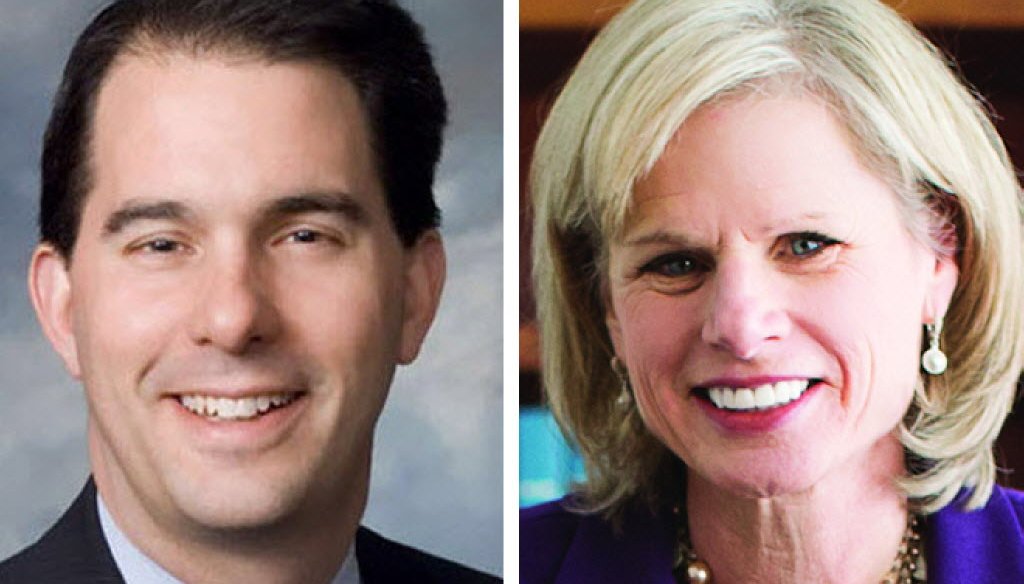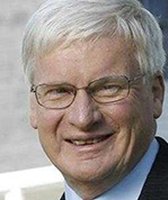Stand up for the facts!
Our only agenda is to publish the truth so you can be an informed participant in democracy.
We need your help.
I would like to contribute

Scott Walker faces Mary Burke in the Nov. 4 election for governor.
Arguments over Gov. Scott Walker’s unfulfilled promise of 250,000 new jobs and Mary Burke’s copying parts of her jobs plan eclipsed most issues in the governor’s race in September.
But with little fanfare, Republican Walker and Democrat Burke have offered plenty of promises that signal their governing priorities and set out specific goals for a four-year term.
That’s how we like it here at PolitiFact Wisconsin.
We have been tracking 65 of Walker’s promises from 2010 on our Walk-O-Meter. With some high-profile exceptions, the first-term governor has made good on a majority of the promises we tracked. (See related story).
PolitiFact Wisconsin will track the winner’s promises starting in 2015. If Walker wins re-election, we will add his new promises to our Walk-O-Meter. If Burke wins, we’ll launch a Burke-O-Meter. (PolitiFact National tracks the promises of President Barack Obama.)
Sign up for PolitiFact texts
Here is a look at key promises the two candidates have made, with an eye toward what the pledges say about their priorities if they win.
Walker’s plans
While voters may see campaign promises as disposable, based on Walker’s first term it would be a mistake to view his pledges in that light.
Walker made a run at achieving most of the promises we tracked. And this time around he’s returned to similar themes, promising to do more to reduce taxes and trim the size and reach of government.
In his first term, Walker and Republican lawmakers reduced income tax rates and cut property taxes while decreasing state aid to schools and enacting various pro-business measures.
Call this Walker 2.0. He has promised:
-- Property taxes on the typical homeowner in Wisconsin will be lower in 2018 than in 2010.
-- Income taxes will be lower in 2018 than today.
-- There will be no boost in the state sales tax rate.
-- To again return funds to taxpayers when future state budget surpluses arise.
-- The tuition freeze at University of Wisconsin schools will be continued and technical college tuition will be frozen.
There’s more.
Walker’s blueprint for a second term makes clear that he wants to push certain welfare recipients to work through drug tests, job training and time limits; find new ways to pay for road building; and do more to limit lawsuits against businesses.
He again would expand tax funding to private schools; continue to make the Department of Natural Resources more development-friendly; and cut government regulations.
Of course, candidates often withhold their boldest plans from voters -- Walker, for example, said in 2010 he’d bargain with unions over pensions and health insurance, but instead ended union power over those issues.
Based on what we know, Walker’s platform is somewhat more oriented than Burke’s to an appeal to his political base as a way of driving up turnout, said Mordecai Lee, a University of Wisconsin-Milwaukee political science professor and former Democratic state senator.
"That's because midterm elections skew Republican while presidential elections skew Democratic," Lee said.
Another political observer, retired UW-La Crosse professor Joe Heim, thinks Walker’s tax-cut agenda helps attract male voters. Walker opened a 28 percentage-point lead among males in the latest Marquette University Law School poll, while females backed Burke by 14 points.
In the wake of falling well short of his promise to help Wisconsin create 250,000 net new private-sector jobs, Walker has largely avoided setting specific economic goals.
It’s unclear if he would continue to restore aid to public education that he cut to help finance tax cuts and other priorities.
He’s made it plain that he wants to protect Act 10, which sharply limited collective bargaining by public employees, but won’t say if he would veto right-to-work legislation barring private-sector workers from having to join a union as part of their job.
Burke’s proposals
As you might expect from a campaign challenging a sitting governor, Burke has taken many positions that amount to promises to roll back actions by Walker.
Burke, the former Commerce chief under Democratic Gov. Jim Doyle, has said she would:
-- Reinstate the Equal Pay Enforcement Act that Doyle signed in 2009 and Walker repealed in 2012. The law toughened Wisconsin’s protections against employment discrimination vs. women and others.
-- Work to increase state funding for higher education, including for student financial aid.
--Back phasing in a minimum wage of $10.10 in three stages over two years, up from the current $7.25. (Walker has not supported hiking the wage).
-- Restore collective bargaining rights to public workers. Burke said she would make sure that unions regain the ability to deduct union dues from state workers’ paychecks -- Walker moves she believes were designed to punish unions.
-- Stop any further expansion of tax-funded voucher schools.
Overall, Lee thinks Burke’s platform is somewhat less specific than Walker’s, a common strategy among challengers.
"Essentially, a challenger says: If you're unhappy, vote for me," Lee said. "I don't want to give anyone a reason not to vote for me."
There’s a risk in that strategy, though.
A Marquette University Law School poll in mid-September 2014 found a big edge for Walker when likely voters were asked if the candidates had been clear enough about their agendas to win confidence that voters know what they are getting.
Neither candidate has attached a lot of specific numbers and timetables to their economic plans. Burke in her economic blueprint aims high, though, on where the state should eventually land.
On job creation, Burke says Wisconsin’s job-creation pace over four years should "outpace the nation until our workers catch up, and then set our sights on becoming a thriving Top 10 Economy in terms of job growth."
On wages, she wants to increase the average wage for Wisconsin workers, and work toward a longer-term goal of exceeding the national average.
On taxes, she has not offered the details Walker has, but has said, "Now is not the time
to impose additional economic burdens on Wisconsinites" and noted the state’s high national ranking on property and income taxes as a share of income.
"We will reduce that share over time by holding the line on taxes, making government more efficient and growing the tax base," Burke’s plan says.
On social issues, Burke said she would sign legislation allowing gay marriage and defend the state’s domestic partner registry. Walker is on the other side of both issues.
Burke wants to end the ban on state-backed venture capital funds going to biotechnology firms that may use embryonic stem cell research.
She has tried to persuade two distinct groups, Heim said, going after Democrats by opposing Walker’s positions while hammering on the jobs issue to try to pick off independents.
Finally, could a Gov. Walker or Gov. Burke get much done?
Legislative elections will help answer that. Republicans have a huge advantage in the Assembly and appear likely to hold at least that chamber. The Senate is up for grabs.
Controlling both chambers would empower and embolden Republicans to add to the list of conservative measures approved in the last four years, Lee said.
Burke would have a tougher time with her agenda, but Heim said her moderate tendencies give her a better chance than a more liberal Democrat would have to work with a GOP-controlled or split Legislature.
Our Sources
Scott Walker, "Continuing Wisconsin's Comeback" plan
Mary Burke, "Invest for Success" plan
PolitiFact Wisconsin archive
Media reports















































